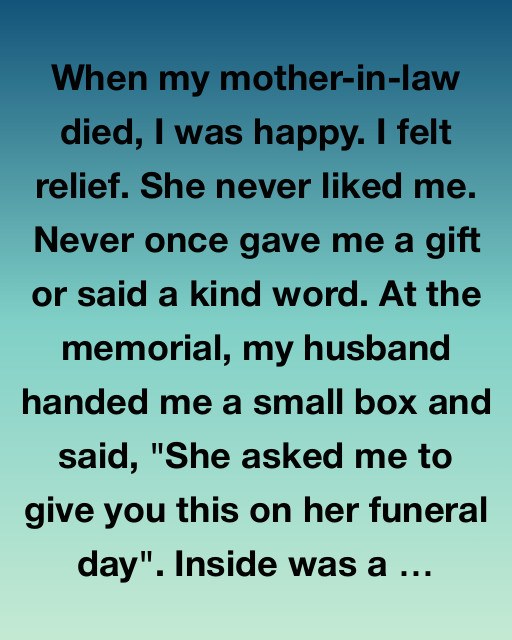When my mother-in-law died, I didn’t cry. I didn’t feel sadness. What I felt was relief.
Harsh, I know. But she had never liked me. Not once in the ten years I’d been married to her son did she give me a gift, say a kind word, or even pretend to approve of me. Every holiday was an icy performance. Every family dinner, a test I could never pass.
So yes, when she passed, I felt… free.
But then, at the memorial, my husband slipped me a small velvet box.
“She wanted you to have this,” he whispered. “She was very clear. Said you should open it today. Alone.”
That last word lodged in my chest like a splinter. Alone.
I waited until we got home, after the guests left and our son was asleep. I sat on the edge of the bed and lifted the lid. Inside was a delicate silver necklace with a teardrop-shaped sapphire pendant.
It was beautiful. Old, vintage maybe. But what made me pause wasn’t the sapphire. It was the engraving on the back.
Two tiny initials: L.T.
My initials.
The Letter
Confused, I dug deeper into the box. That’s when I found it: a folded note, my name written in her sharp, unforgiving handwriting.
I hesitated before opening it. This was a woman who had spent years making me feel unwelcome. What could she possibly have to say to me now?
Her words stunned me:
“If you’re reading this, I’m gone. And if you’re reading it, that means I finally grew a spine.
I never said it when I should have, but I was wrong about you. And I need to tell you why.”
I froze. She was not the kind of woman who admitted mistakes. Ever.
“I hated you not because of who you were, but because of what you reminded me of.
You were young, driven, outspoken. I used to be like that once.
Until I gave it all up for marriage. For appearances. For a life that never said thank you.
When you married my son, I feared he’d ruin you the way his father ruined me.”
My throat tightened. She wasn’t describing me—she was describing herself.
“So instead of loving you, I judged you. I pretended you weren’t good enough, when deep down I knew you were more than I ever had the courage to be. And I regret that.”
Tears blurred the page. I’d spent years building armor against her coldness, never knowing it came from her own scars.
The last part of the letter hit the hardest:
“The necklace was mine once. It was given to me by a man I loved before I met my husband. His name was Lucas. The L was for him. I added the T later—for the daughter I never had. I always wanted a girl I could raise to be strong.
I never had her.
But in a strange way… I see her in you.”
I pressed the pendant to my chest and cried like I hadn’t in years.
The Key
A week later, at the reading of her will, we sat politely, expecting little. She hadn’t been wealthy. Just the house, a modest account, some jewelry.
But then the lawyer said something unusual.
“She left a special clause for her daughter-in-law.”
That’s me.
He handed me an envelope. Inside was a brass key and a note that read: “She’ll know what it’s for.”
And I did.
Years ago, before things soured, I’d once noticed a locked attic door in her house. When I asked about it, she snapped, “That room’s off-limits.”
Now, holding the key, I knew exactly where to go.
The Attic
The house felt strange without her—quiet, softer, like the tension had left with her. My husband stayed downstairs while I climbed the stairs alone, key trembling in my hand.
The attic door was hidden behind a faded curtain. The lock clicked open easily.
The room smelled of cedar and dust. In the center was an old trunk, surrounded by boxes stacked haphazardly. I opened the trunk.
Inside were journals. Dozens of them. Leather-bound, spiral notebooks, even scraps of paper stuffed into envelopes.
The first one I opened was dated 1973.
She had written everything. Her dreams of moving to Paris. How she loved painting. How she felt trapped in a marriage that cared more about appearances than her happiness.
There was even a photo of a watercolor she’d painted: a woman standing alone in a garden. On the back, she’d scrawled, “Me, before I disappeared.”
I sobbed.
One journal, from 1984, spoke of Lucas. The man who gave her the necklace. Her parents disapproved, she wrote. She let him go. But she never forgot him.
Hours passed in that attic. By the time I came down, I wasn’t the same.
The Secret Gift
Weeks later, another letter came from her lawyer. She’d left a safety deposit box in my name.
Inside was a check for $40,000.
And another note:
“If you ever decide to chase your own dream, this is my way of helping. Don’t tell my son. He wouldn’t understand. He’s too practical, like his father. But you… you will.”
That money became the seed for something extraordinary.
The Teardrop
I used it to open a tiny gallery space downtown. Not fancy, just four white walls and good lighting. A place for overlooked artists—especially older women—who never had the chance to be seen.
I named it The Teardrop, after her pendant.
Her journals inspired me to display her paintings too. Small, soft, heartbreaking works that spoke of loneliness, regret, and longing.
People cried in front of them. One woman whispered, “I feel like she painted my life.”
Her art was finally being seen. Her voice was finally being heard.
And through her, I found my purpose.
Full Circle
It’s been three years now.
The necklace rests on my collarbone most days. The journals are archived in the gallery for anyone who wants to know the soul behind the brush.
My husband visited once. He stood quietly in front of that garden painting, the one titled “Me, before I disappeared.” His eyes filled with tears. “I never knew she felt this way,” he whispered.
Neither did I.
But now, the world knows.
The Lesson
Sometimes the people who hurt us most are the ones hiding the deepest wounds. My mother-in-law wasn’t just bitter—she was broken, silenced, and haunted by the choices she didn’t make.
In the end, she gave me her truth. Her regrets. And her hope that I’d live differently.
And somehow, her last act of love turned me into the daughter she never had.
So if you’ve ever been hated for no reason, remember this:
It’s often not about you. It’s about the battles they’ve already lost.
And sometimes, forgiveness arrives in strange packages—a sapphire teardrop, a key to an attic, a letter that changes everything.


